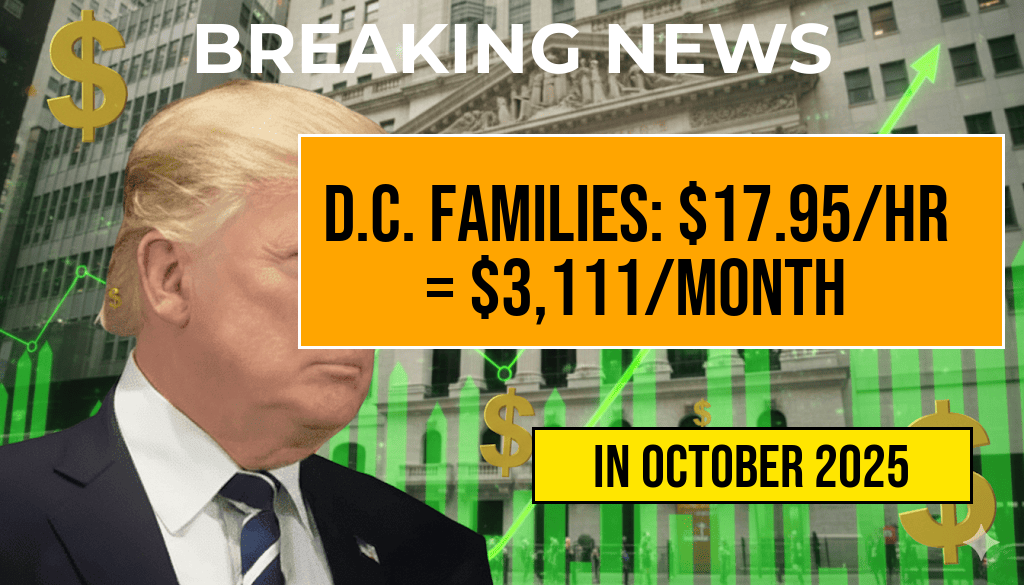For many families residing in Washington, D.C., earning an hourly wage of $17.95 translates into a pre-tax monthly income of approximately $3,111. This figure provides a clearer understanding of how hourly wages stack up against living costs in the nation’s capital, where housing, transportation, and other essentials often come with a premium. While this hourly rate might seem modest compared to the area’s median income levels, it underscores the challenges faced by lower- to middle-income earners striving to maintain stability amid rising expenses. As policymakers and community advocates analyze income data, this wage benchmark serves as a vital reference point for discussions on affordability, minimum wage policies, and economic mobility within the city.
The Income Breakdown: From Hourly Wage to Monthly Earnings
Understanding the relationship between hourly wages and monthly income requires considering the standard workweek and the number of weeks in a month. A typical full-time schedule assumes 40 hours per week. Multiplying this by the hourly wage gives the weekly earnings:
| Calculation Step | Amount |
|---|---|
| Hourly wage | $17.95 |
| Hours per week | 40 |
| Weekly earnings | $17.95 × 40 = $718 |
| Weeks per month (approximate) | 4.33 (52 weeks / 12 months) |
| Estimated monthly income before taxes | $718 × 4.33 ≈ $3,111 |
It’s crucial to note that this calculation assumes consistent hours and does not account for potential overtime, part-time work, or unpaid leave, which could significantly influence actual take-home pay.
Living Costs in D.C.: How Far Does $3,111 Go?
Washington, D.C., is renowned for its high cost of living, driven largely by housing prices, transportation, and childcare expenses. According to recent data from the Numbeo Cost of Living Index, the median rent for a one-bedroom apartment in the city center exceeds $2,300 per month. This leaves less room for other essentials such as groceries, utilities, healthcare, and transportation, especially for those earning around $3,111 before taxes.
Housing Costs
- Median rent in city center: Over $2,300/month
- Average utilities: Approximately $150–$200/month
- Transportation: Public transit passes cost around $81/month, or owning a vehicle entails additional expenses like insurance and parking
Other Expenses
- Groceries: Estimated at $300–$400/month for a single adult
- Healthcare: Varies depending on coverage, but out-of-pocket costs can add up
- Childcare and education: Significantly high, often exceeding $1,000/month in private settings
Given these costs, a pre-tax income of approximately $3,111 may not suffice for a comfortable lifestyle without additional support or dual incomes, highlighting ongoing affordability concerns in the city.
Implications for Workers and Policymakers
Minimum Wage and Economic Mobility
The current federal minimum wage stands at $7.25 per hour, though many states and municipalities, including D.C., have enacted higher standards. As of 2023, D.C. has a minimum wage of $16.10 per hour, with plans to incrementally increase it to $17.50 by 2026. The $17.95 wage figure exceeds the local minimum, indicating that many workers earn just above the baseline, yet still face financial strain.
Addressing Income Disparities
Advocates argue that raising wages alone isn’t enough to alleviate affordability issues. Broader policies focusing on affordable housing, transportation subsidies, and healthcare access are critical. According to the Cost of Living Wikipedia entry, adjusting economic policies to reflect regional costs can help bridge the gap between earnings and expenses for city residents.
What This Means for D.C. Families
For families earning around $17.95 an hour, there is often a delicate balancing act between income and expenses. While such wages may meet basic needs in some regions, in D.C., they often fall short of sustaining a household comfortably. This reality underscores the importance of targeted policies aimed at increasing wages, expanding affordable housing options, and reducing living costs. As economic conditions evolve, understanding the true purchasing power of wages remains vital for shaping strategies that support low- and middle-income families in the nation’s capital.
Frequently Asked Questions
What is the main focus of the article?
The article explains that earning $17.95 an hour in D.C. roughly translates to a monthly income of approximately $3,111 before taxes, highlighting the relationship between hourly wages and monthly earnings for local families.
How is the monthly income calculated from the hourly wage?
The article demonstrates that by multiplying the hourly wage of $17.95 by the total number of work hours in a month (typically around 173 hours for full-time employment), families can estimate their monthly earnings of about $3,111 before taxes.
Why is understanding this income conversion important for D.C. families?
Understanding the conversion helps families assess their financial situation, plan budgets effectively, and determine if their earnings meet the cost of living and housing expenses in D.C..
Does the article discuss taxes affecting the net income?
Yes, the article notes that the monthly income of $3,111 is before taxes, implying that actual take-home pay will be lower once taxes and other deductions are applied.
How can families use this information for financial planning?
Families can use the estimated monthly income based on their hourly wage to create budgets, evaluate affordability for housing, childcare, and other expenses, and plan for financial stability in the D.C. area.

Leave a Reply